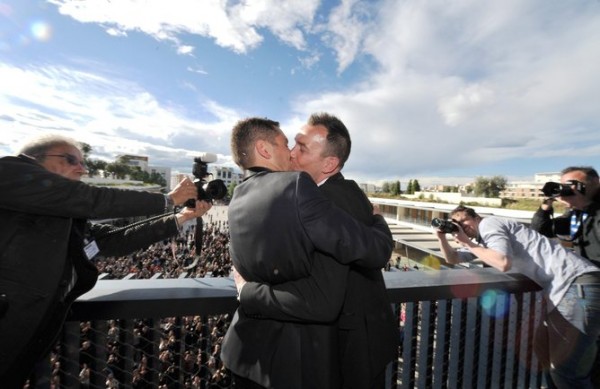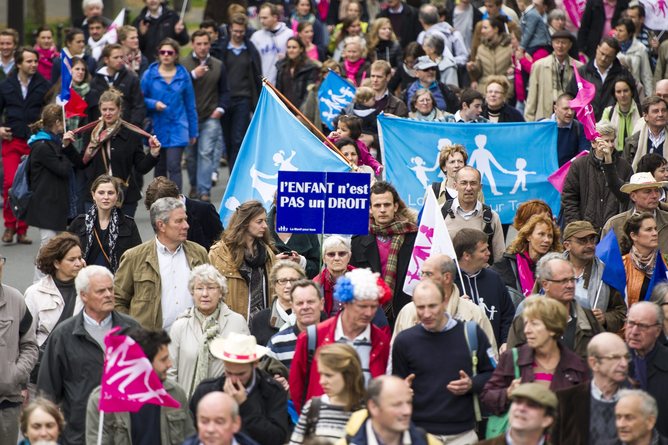The French love a good street protest, to the point where it could be thought of as a national sport.
And there has been no shortage of people on French streets making their views felt recently. But there are not the usual suspects, trade unions protesting to protect generous entitlements or students angry about the things that get students angry.
Instead, the issue of gay marriage, recently legalised France has provoked enormous anger. Alongside massive street protests, a right wing author recently shot himself on the altar at Notre Dame in protest at the development.
What do these protests tell us about modern France? Is it really the urbane and sophisticated nation
The political situation?
France’s centre left President, Francois Hollande, is the country’s most unpopular leader since polls have been taken.
To compound his woes polls suggest he would be beaten by nationalist leader Marine Le Pen in a presidential race, even if only by a percentage point.
Le Pen’s party, the Front National is fairing well with its protectionist economics, cultural assertiveness and plans to vigorously curtail mass immigration.
Both Le Pen and Hollande trail behind Sarkozy.
The economy fares no better than Hollande. Its moribund state is highlighted by high unemployment moving beyond 10%, tension with Germany, a criminal trial against the corrupt ex-budget minister, Cahuzac, and the flight of the wealthy to less burdensome tax regimes, Gerard Depardieu amongst them.
Mariage Pour Tous – Marriage for All
It was a social, rather than an economic issue, which saw the opposition to the government vividly move from the political arena to the street.
France is the most recent of 14 countries to legalise gay marriage. The others are principally in the Anglosphere, Latin America and Scandinavia.
Proponents of gay marriage and adoption naturally enough frame the issue in terms of a progressive struggle against homophobia. Their opponents frame it in terms of the rights of children to biological parents, and to be raised by them. For the protesters gay marriage and gay parenting are inseparable issues.
Whilst united against gay marriage and adoption, the movement is divided over civil union. One of the defining issues which has led the more staunchly conservative elements to form Francais Printemps (French Spring – in reference to the Arab Spring of 2011).
Manif Pour Tous – Protests for All
The lead up and ratification of the law allowing gay couples to marry and adopt has seen opposition to the protests from conservatives, traditionalists, Catholics and nationalists on the streets of Paris and regional centres. They have marched in their hundreds of thousands.
The numbers for last Sunday’s protest are contested with the government claiming 150,000, whilst the organisers claim 1,000,000.
The Independent suggests around 400,000. Whatever the exact number they are vast. It’s not only the numbers but the nature of marchers which make it remarkable, many pushing strollers down the street in a visibly family orientated protest.
The demonstrations have been largely peaceful, though there have been confrontations with the police. The violent hardliners number three to five hundred.

France’s first gay marriage was sealed in the southern city of Montpellier despite heated protests across the nation. EPA/Gerard Julien
Another common form of protest is the heckling of government ministers wherever they present. This form of flash protest is designed to keep the issue in the public sphere and ensure no respite for the Partie Socialiste.
Activists of Generation Identitaire, the same ethno-regionalist movement that broke into and demonstrated at the Poitiers Mosque site climbed atop the socialist party HQ, unfurling a banner asking for Hollande’s resignation.
The most startling individual protest against the law was the death of Dominique Venner. A historian and recipient of an award from the prestigious Academie Francaise, Venner shot himself in Notre Dame Cathedral.
The 78-year-old veteran of the Algerian war and militant nationalist scene left a suicide note in which he described his desire to shock France into a national renaissance. He perceived attacks on the traditional family, mass non-European immigration to be the poison slowly killing French and European civilization.
There have been counter protests by gay advocates and activists from Femen, though significant in number, they haven’t come close to the proportions of Manif Pour Tous.
The Police, the Public and the PS
The first marriage under the new law occurred this week between Vincent Autin and Bruno Boileau. The PS’s minister for women, Najat Vallaud-Belkacem, was in attendance, as were members of the riot police.
The latest polls suggest 53% of voters support the legalization of gay marriage, indicative of the contentious nature of the law.
The issue of gay adoption, more divisive than gay marriage, is yet to be addressed in the parliament.
For many, France, and particularly Paris, symbolizes the urbane, and cosmopolitan. However, there is another France. A conservative, Catholic, regional France: a France deeply embedded in traditions often at odds with social and economic liberalism.
This other France is making itself known, loudly.
Author: Haydn Rippon
Publication: The Conversation
Date: June 3 2013

